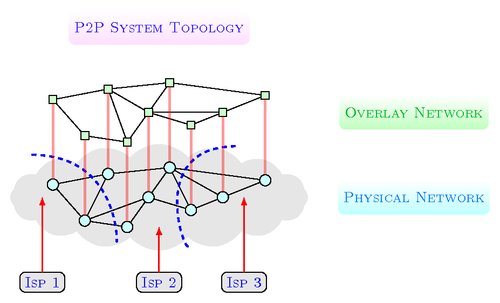Physical and overlay topology characterization of a P2P system topology

Edit and compile if you like:
% P2P system topology
% Author Fiandrino Claudio 2011 - http://claudiofiandrino.altervista.org/
% Description: physical and overlay topology characterization
\documentclass{article}
\usepackage{tikz}
\usepackage[active,tightpage]{preview}
\usetikzlibrary{shapes}
\PreviewEnvironment{tikzpicture}
\setlength\PreviewBorder{7pt}
\definecolor{pinegreen}{cmyk}{0.92,0,0.59,0.25}
\definecolor{royalblue}{cmyk}{1,0.50,0,0}
\definecolor{lavander}{cmyk}{0,0.48,0,0}
\definecolor{violet}{cmyk}{0.79,0.88,0,0}
\tikzstyle{cblue}=[circle, draw, thin,fill=cyan!20, scale=0.8]
\tikzstyle{qgre}=[rectangle, draw, thin,fill=green!20, scale=0.8]
\tikzstyle{rpath}=[ultra thick, red, opacity=0.4]
\tikzstyle{legend_isps}=[rectangle, rounded corners, thin,
fill=gray!20, text=blue, draw]
\tikzstyle{legend_overlay}=[rectangle, rounded corners, thin,
top color= white,bottom color=green!25,
minimum width=2.5cm, minimum height=0.8cm,
pinegreen]
\tikzstyle{legend_phytop}=[rectangle, rounded corners, thin,
top color= white,bottom color=cyan!25,
minimum width=2.5cm, minimum height=0.8cm,
royalblue]
\tikzstyle{legend_general}=[rectangle, rounded corners, thin,
top color= white,bottom color=lavander!25,
minimum width=2.5cm, minimum height=0.8cm,
violet]
\begin{document}
\begin{tikzpicture}[auto, thick]
% Cloud creation
\node[cloud, fill=gray!20, cloud puffs=16, cloud puff arc= 100,
minimum width=7cm, minimum height=2.5cm, aspect=1] at (0,0) {};
% Physical layer nodes
\foreach \place/\x in {{(-2.5,0.3)/1}, {(-1.75,-0.55)/2},{(-1.2,0.55)/3},
{(-0.75,-0.7)/4}, {(-0.25,0)/5}, {(0.25,0.7)/6}, {(0.75,-0.3)/7},
{(1.5,0)/8},{(2.5,0.4)/9}}
\node[cblue] (a\x) at \place {};
% Physical layer links
\path[thin] (a1) edge (a2);
\path[thin] (a1) edge (a3);
\path[thin] (a2) edge (a3);
\path[thin] (a3) edge (a6);
\path[thin] (a2) edge (a4);
\path[thin] (a5) edge (a6);
\path[thin] (a5) edge (a4);
\path[thin] (a5) edge (a2);
\path[thin] (a5) edge (a7);
\path[thin] (a6) edge (a7);
\path[thin] (a6) edge (a9);
\path[thin] (a6) edge (a8);
\path[thin] (a8) edge (a9);
\path[thin] (a7) edge (a8);
% ISPs labelling
\draw[very thick, blue, dashed]
(1.8,1.2).. controls +(left:2.2cm) and +(down:0.5cm) ..(0.7,-1.1);
\draw[very thick, blue, dashed]
(-3,1).. controls +(right:2.2cm) and +(down:0.4cm) ..(-1,-1);
\node[legend_isps] (i1) at (-2.75,-2) {\textsc{Isp 1}};
\node[legend_isps] (i2) at (0,-2) {\textsc{Isp 2}};
\node[legend_isps] (i3) at (2,-2) {\textsc{Isp 3}};
\draw[-latex, thick, red] (i1) -- (-2.75,0);
\draw[-latex, thick, red] (i2) -- (0,-0.7);
\draw[-latex, thick, red] (i3) -- (2,0);
% Overlay layer nodes
\foreach \place/\i in {{(-2.5,2.3)/1},{(-1.75,1.45)/2},{(-1.2,2.55)/3},
{(-0.75,1.3)/4}, {(-0.25,2)/5}, {(0.25,2.7)/6}, {(0.75,1.7)/7},
{(1.5,2)/8},{(2.5,2.4)/9}}
\node[qgre] (b\i) at \place {};
% Overlay layer links
\path[thin] (b1) edge (b2);
\path[thin] (b2) edge (b4);
\path[thin] (b4) edge (b5);
\path[thin] (b5) edge (b7);
\path[thin] (b4) edge (b3);
\path[thin] (b7) edge (b8);
\path[thin] (b8) edge (b9);
\path[thin] (b9) edge (b6);
\path[thin] (b6) edge (b3);
\path[thin] (b3) edge (b1);
\path[thin] (b5) edge (b8);
\path[thin] (b5) edge (b3);
\path[thin] (b5) edge (b6);
% Links between overlay and physical topology
\foreach \i in {1,...,9}
\path[rpath] (a\i) edge (b\i);
% Legends
\node[legend_general] at (0,4){\textsc{P2P System Topology}};
\node[legend_overlay] at (6,2){\textsc{Overlay Network}};
\node[legend_phytop] at (6,0){\textsc{Physical Network}};
\end{tikzpicture}
\end{document}
Click to download: p2p-topology.tex • p2p-topology.pdf
Open in Overleaf: p2p-topology.tex


